100 ECG’s
Supraventricular: (18 questions)
Questions
-
1
68 year old lady collapses while shopping. She has a past medical history of trigeminal neuralgia, depression, COPD and hypertension. She has a 40 pack year smoking history but does not drink alcohol. She has no history of cardiac or vascular disease. An ECG is taken. What is the most suitable long term medical treatment for this lady? 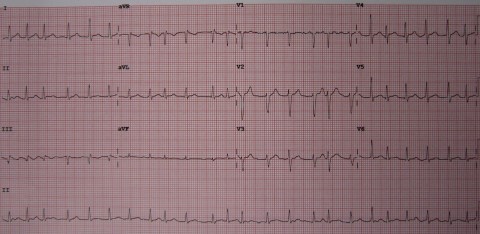
a Bisoprolol and Aspirin b Bisoprolol and Warfarin c Nifedipine and Warfarin d Verapamil and Warfarin e Digoxin -
2
55 year old banker collapses on his way to work. The paramedic notes a low blood pressure and a fast heart rate. He is taken immediately to the local hospital where he is complaining of shortness of breath. He is still hypotensive at 89/41 and is tachycardic. He has a past medical history of hypertension, obesity, obstructive sleep apnoea, and treated hypothyroidism. His ECG is shown. What is the most suitable treatment ? 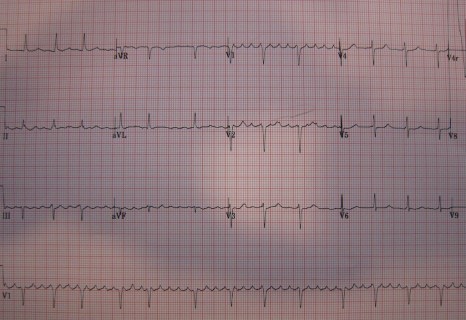
a 300mg Amiodarone IV bolus b 500 ml of Gelofuscin stat and re-assess in 30 minutes c 900mg Amiodarone over 24 hours d Bisoprolol for rate control e Synchronised DC-Cardioversion -
3
42 year old businessman presents to the emergency department with palpitations and feeling of dizziness. He has a past medical history of recurrent palpitations but he has “never felt this ill”. He is alert and oriented and denies chest pain. His ECG is shown. What is the best course of action ? 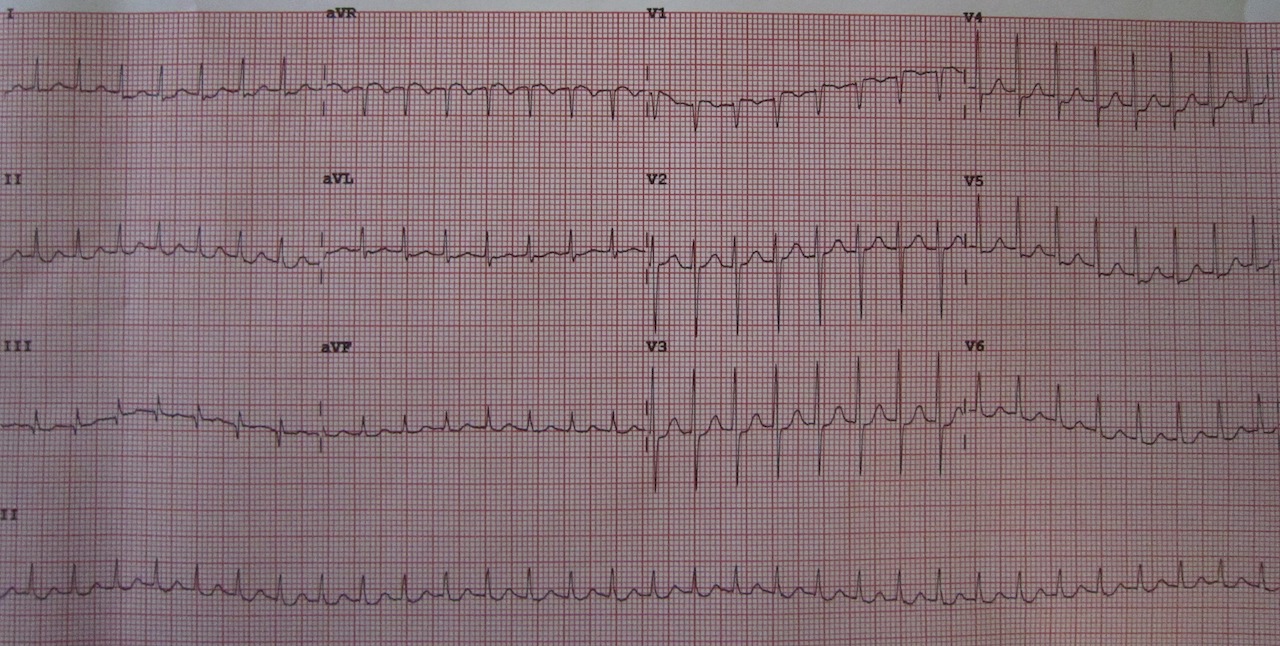
a 300mg Amiodarone b 6mg Adenosine c Bisoprolol for rate control and symptomatic treatment d DC cardioversion to restore sinus rhythm e Do nothing as this is a panic attack -
4
36 year old receptionist presents to the emergency department with palpitations. She has a history of asthma, depression, type I diabetes and obsessive compulsive disorder. She also reports shortness of breath, sweating and tingling of the lips. She started experiencing these symptoms on her way back from work where she was made redundant. Her heart rate is 120 regular. ECG is shown. What is the best course of treatment ? 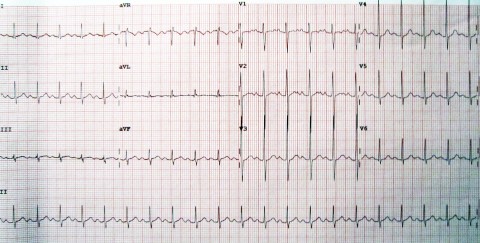
a Adenosine b Bisoprolol and Warfarin c DC-Cardioversion d Reassurance e Primary Angioplasty for Anterior MI -
5
A 64 year old man collapses while shopping. He has a past medical history of trigeminal neuralgia, depression, anxiety and hyperlipidaemia. He has a 40 pack year smoking history but does not drink alcohol. She has no history of cardiac or vascular disease. An ECG is taken. What is the most suitable long term medical treatment for this man? 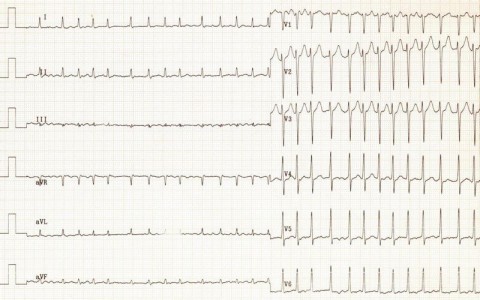
a Bisoprolol only b Bisoprolol and Warfarin c Nifedipine only d Verapamil and Warfarin e Digoxin -
6
A 55 year old man is referred to the cardiology clinic for an abnormal ECG (Shown). He has a past medical history of depression, emphysema and diverticular disease. He is on citalopram and tiotropium. Which of the following would you start him on in response to this abnormal ECG considering it is a long-standing problem ? 
a Bisoprolol only b Bisoprolol and Warfarin c Verapamil only d Verapamil and Warfarin e Digoxin -
7
A 66 year old woman attends her GP surgery for follow up of an abnormal ECG (Shown). She has a past medical history of endometriosis, Peripheral vascular disease and depression. She has no heart problems, no hypertension, no diabetes, and no history of ischaemic strokes. Which of the following is the correct combination of medications for the GP to start them on considering it is a long-term problem ? 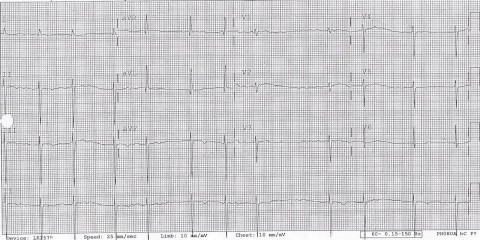
a Bisoprolol only b Bisoprolol and Warfarin c Verapamil only d Verapamil and Warfarin e Digoxin and Warfarin -
8
A 55 year old man is admitted to the emergency department with shortness of breath. His ECG is shown. His blood pressure is 84/47 and he is slightly confused. What is the most appropriate therapy for this patient ? 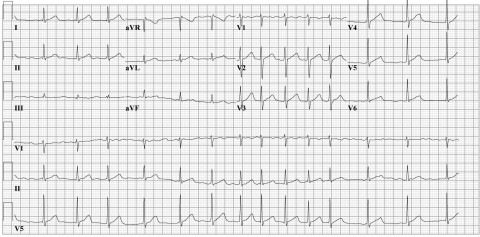
a Bisoprolol only b Bisoprolol and Warfarin c Digoxin d Defibrillation e DC Cardioversion -
9
A 34 year old man attends the emergency department complaining of palpitations. He has had similar episodes before which were treated successfully with Adenosine. You ask your medical student to bring you some adenosine from the treatment room. While waiting, the patient starts complaining of chest pain, his blood pressure drops to 70/35 and he appears confused and very short of breath. What is the most appropriate acute action to take ? 
a 300mg Amiodarone b Defibrillation c Bisoprolol for rate control and symptomatic treatment d DC cardioversion to restore sinus rhythm e Do nothing as this is a panic attack -
10
A 40 year old woman attends the emergency department complaining of central sharp chest pain and shortness of breath. She is a tourist from Australia and has only been in the country for two days. Her only medications are Vitamin D3 and the combined oral contraceptive pill.Examination reveals right calf tenderness. Her ECG is shown. Which of the following groups of medications should she be started on? 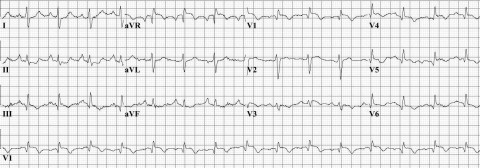
a ADP receptor antagonist b GPVI receptor antagonist c GPIIbIIIa antagonist d Epoxide reductase inhibitor e Cycloxygenase inhibitor -
11
A 51 year old man is admitted with palpitations. He has no past medical history and gets an annual health-check within his private health insurance company. His previous annual ECGs, including one done two days ago, show him in Sinus Rhythm with no signs of ischaemia. A new ECG is done (shown). A decision is made to start him on Flecainide. What class of anti-arrhythmics is Flecainide in ? 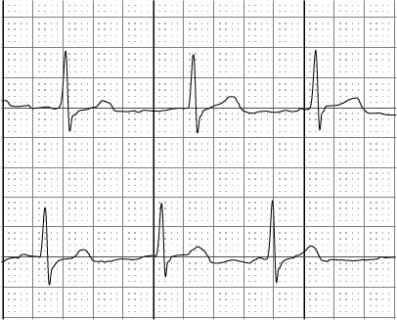
a Class III b Class Ia c Class Ib d Class Ic e Class IV -
12
A 34 year old woman attends the emergency department complaining of shortness of breath, chest pain, and palpitations. Her blood pressure is 84/57 and her heart rate is 116. She has recently experienced some unintentional weight loss and has been having difficulty concentrating and sleeping. She takes no regular medications and has no past medical history. An ECG is done (shown). What is the likely cause of her condition ? 
a Idiopathic b Hypertension c Ischaemic Heart Disease d Atrial myxoma (Cancer of the atrium) e Hyperthyroidism -
13
An 18 year old man is brought by ambulance at 3am after being found unconconscious on the street. He is accompanied by his friend who says that they were “partying hard” immediately before this man’s collapse. The friend reports that they drank large amounts of alcohol mixed with a cocktail of drugs including cannabis, crack cocaine and crystal meth, but that his mate is normally fit and well and has no past medical history. The patient is noted to be tachycardic and an ECG is done (shown). What is the most likely cause of this patient’s ECG findings? 
a Alcohol-induced b Malignant hypertension c Ischaemic Heart Disease d Atrial myxoma (Cancer of the atrium) e Hyperthyroidism -
14
A 75 year old man is admitted to the medical ward with a stroke. He has a longstanding history of hypertension and diabetes. He is a current smoker. He says he has diagnosed with an unsual heart rhythm when he was abroad last year but has never really done anything about it. You order an ECG (shown). What is the likely etiology of the ECG findings ? 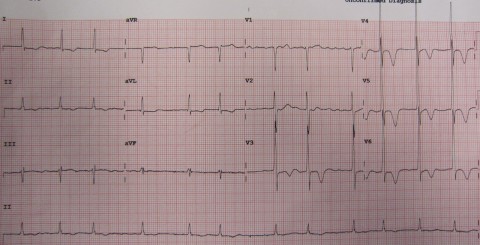
a Alcohol-induced b Hypertension c Ischaemic Heart Disease d Atrial myxoma (Cancer of the atrium) e Hyperthyroidism -
15
A 45 year old man is referred to cardiology outpatient clinic from the GP following having intermittent episodes of palpitations associated with dizziness. The episodes last for less than a minute and are not related to any activity and tend to stop on their on. ECG recorded between these episodes shows normal sinus rhythm. He has a past medical history of asthma but is normally fit and well. Whilst waiting for the cardiologist in the waiting area, he has another episode. An ECG is quickly done by the staff nurse which is shown. Which of the following drugs is the best medication to use to stop these symptomatic episodes when they occur ? 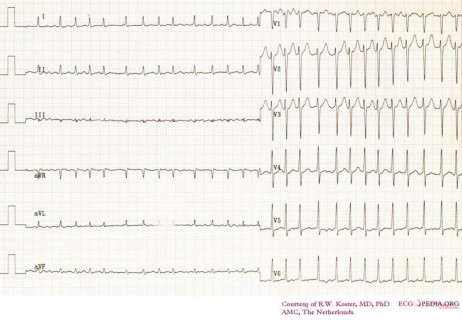
a Amiodarone b Sotalol c Nifedipine d Digoxin e Flecainide -
16
A 45 year old man is referred to cardiology outpatient clinic from the GP following having intermittent episodes of palpitations associated with dizziness. The episodes last for less than a minute and are not related to any activity and tend to stop on their on. ECG recorded between these episodes shows normal sinus rhythm. He has a past medical history of asthma and coronary artery disease. Whilst waiting for the cardiologist in the waiting area, he has another episode. An ECG is quickly done by the staff nurse which is shown. Which of the following drugs is the best medication to use to stop these symptomatic episodes when they occur ? 
a Amiodarone b Sotalol c Nifedipine d Digoxin e Flecainide -
17
A 45 year old man is referred to cardiology outpatient clinic from the GP following having intermittent episodes of palpitations associated with dizziness. The episodes last for less than a minute and are not related to any activity and tend to stop on their on. ECG recorded between these episodes shows normal sinus rhythm. He has a past medical history of asthma and LV dysfunction and dilated cardiomyopathy. Whilst waiting for the cardiologist in the waiting area, he has another episode. An ECG is quickly done by the staff nurse which is shown. Which of the following drugs is the best medication to use to stop these symptomatic episodes when they occur ? 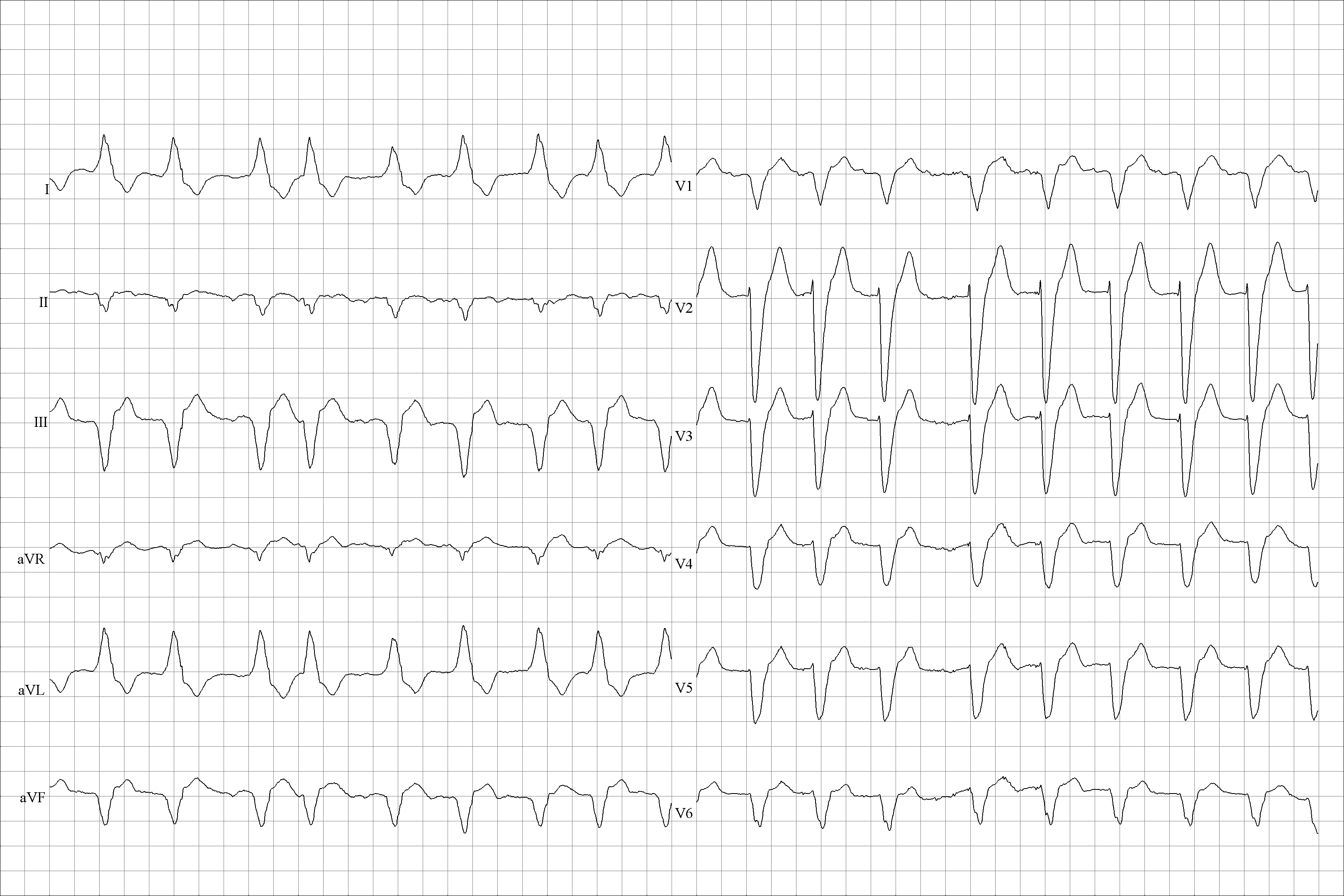
a Amiodarone b Sotalol c Nifedipine d Digoxin e Flecainide -
18
A 55 year old lady is regularly followed up by cardiology for an abnormal heart rhythm (see ECG) of a few weeks duration. A decision is made to perform electrical cardioversion as an elective case. Which of the following interventions is required prior to implementing elective DC cardioversion in this patient ? 
a Transthoracic echocardiography b Transoesophageal echocardiography c Coronary Angiography d Aspirin for 3 weeks e Warfarin for 1 week